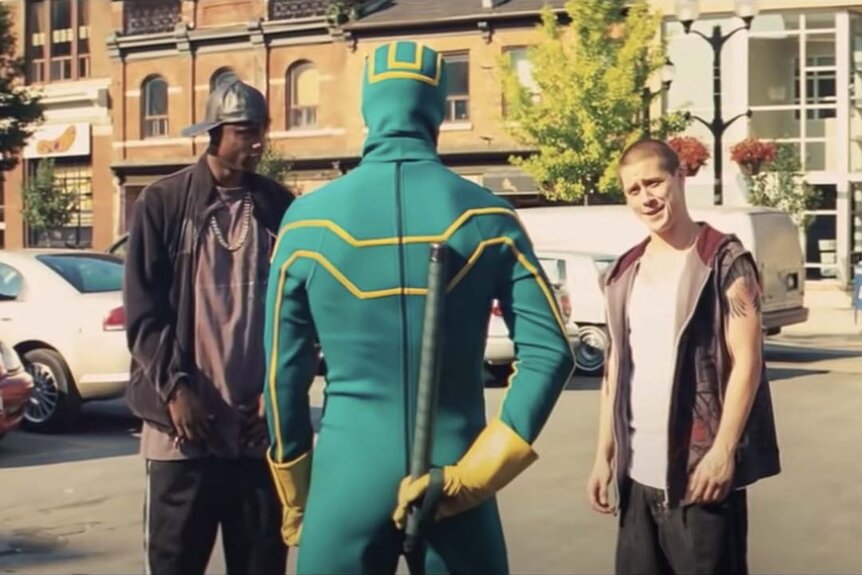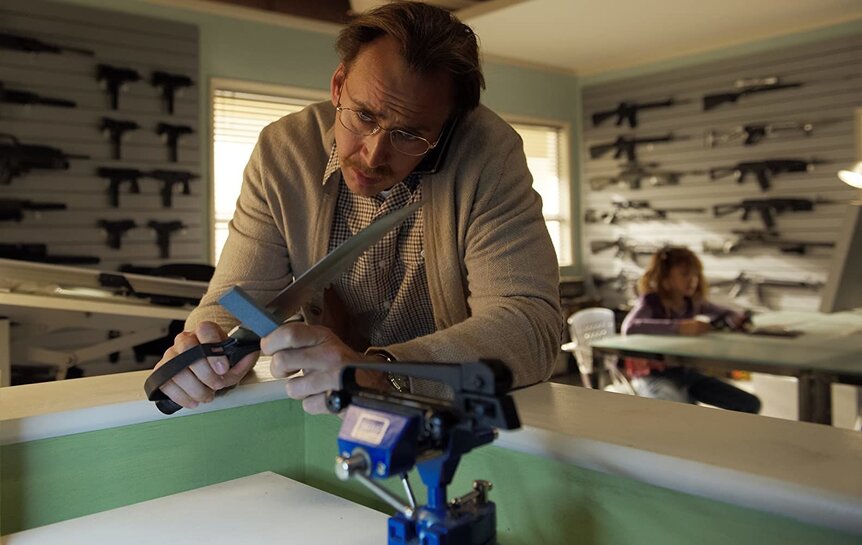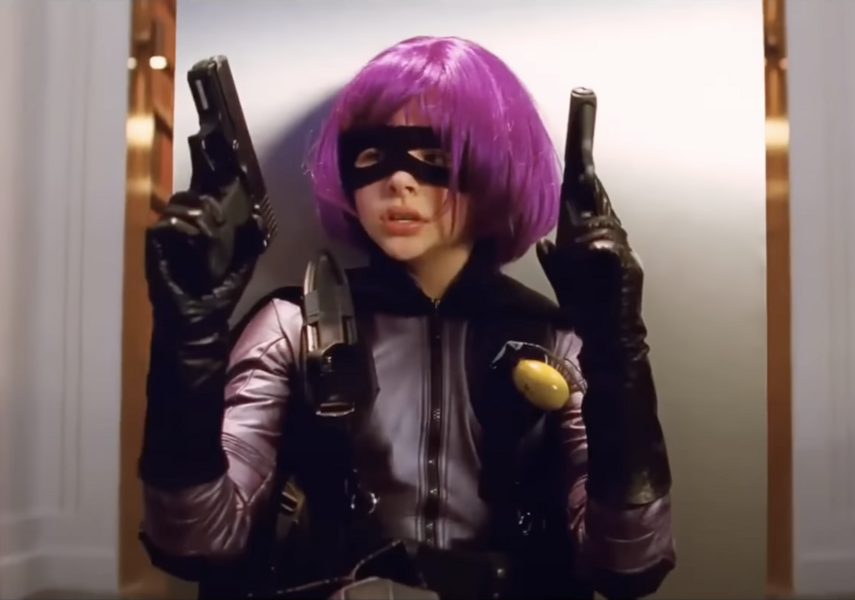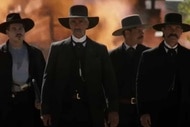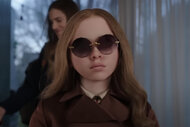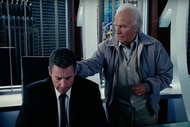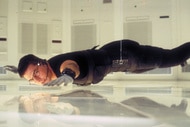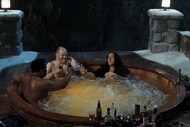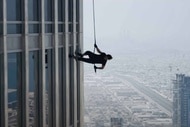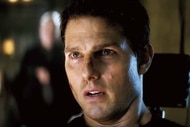Create a free profile to get unlimited access to exclusive videos, sweepstakes, and more!
Remembering Kick-Ass, the Early Indie Comic Book Movie That Changed the Game
It’s a bird! It’s a plane! — No wait, never mind: It’s just a teenaged dork in a bad scuba suit.
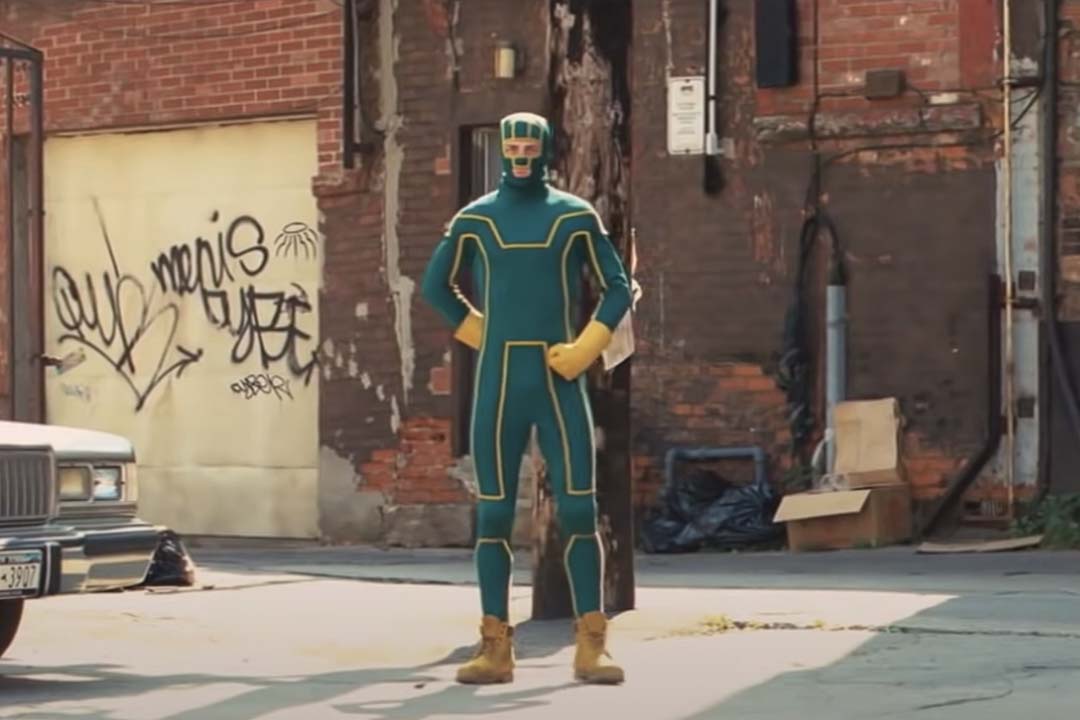
Back when Christian Bale was Batman and Marvel’s Tony Stark had just gotten today’s now-routine comic book movie wave surging toward theaters, superhero films owned a much smaller slice of dominance at the box office than they do now. Sure, there was room for the periodic big-budget blockbuster like The Dark Knight (2008) or Iron Man (also 2008), but the superhero flicks of 15 years ago rolled solo as largely standalone pop culture events.
Fans back in the day weren’t exactly inundated with the current deluge of movies adapted from the comics, and they were definitely conditioned to expect a lengthy wait between big installments. They also were conditioned to expect their heroes to play by conventional comic book rules and look more or less like conventional hero archetypes — assumptions that made the arrival of 2010’s Kick-Ass (streaming here on Peacock!) such a head-turning splash in a pretty small pool, at the time, of pedigreed smack-’n’-pow films.
RELATED: The Best Superhero Parody Films, From Kick-Ass to Mystery Men
Directed by Matthew Vaughn just a year before Vaughn’s well-received X-Men: First Class (and well before 2014’s Kingsman: The Secret Service, his first Kingsman film), Kick-Ass was indeed pedigreed, adapted from the almost-concurrent comic book series from prolific writer Mark Millar and illustrator John Romita Jr. And though it understandably didn’t do MCU numbers at the box office, it did do numbers: Against an estimated production budget of $30 million, the movie’s low-fi story of kids trying to emulate super heroes in the social media age struck a chord with both critics and fans, netting almost $100 million worldwide.
But that’s pretty much where the similarities end between the movie’s goofy teenaged anti-hero Dave Lizewski (Aaron Taylor-Johnson) and cooler caped icons of the DC and Marvel variety: Instead of taking the field against bad guys with limitless Batman tech or supernaturally-imbued powers, Kick-Ass grounds all its would-be superheroes’ aspirations here on this side of cold, uncaring reality.
The setup is simple, but it's also comic book comedy gold: Armed with a healthy sense of justice and fed up with being an anonymous high school nobody, Dave decides to stop being ordinary and dress himself up in a costume to fight evil.
As the movie illustrates to great effect, it’s as harebrained a concept in execution as it sounds on paper. Kick-Ass hilariously walks the audience through every unglamorous thing that makes acting on Dave’s impulse seem like the boneheaded notion it actually is: His green mail-order scuba suit looks stupid, he’s got no athletic gifts to speak of, and his whole concept of what to do next — after assessing his geeky superhero getup in the bedroom mirror — pretty much begins and ends with giving himself an alias (you guessed it, “Kick-Ass”), and definitely doesn’t account for what’s bound to happen when he encounters his first true street foe.
Yep, when you decide to hit the pavement looking like a last-place finisher at a bad costume party, bad things are bound to happen — and almost immediately, they do. But in this movie, Dave doesn’t own the monopoly on homemade hero wear and laughably silly stage names, and through a wild chain of events, he discovers there are people out there already doing more or less what he does… except, of course, for the small detail that they’re genuinely, unmistakably great at it.
Enter Nicolas Cage (Big Daddy) and a pre-teen Chloë Grace Moretz (Hit-Girl) as a father-daughter hero duo who’ve been living the kind of alter-ego lives that could make Bruce Wayne take notes. Dealt a cruel hand by fate in ways young Dave has yet to taste, Cage’s character has been training his daughter since birth to be a pint-sized stone-cold ninja, bent on exacting revenge against a sorry system headed up by gang boss Frank D’Amico (a menacingly funny Mark Strong), the criminal mastermind behind the scenes who greases the city’s sleazy wheels of corruption.
More than once, Big Daddy and Hit-Girl save Dave from certain death just when he’s in over his head, using their well-honed espionage arts to track him back to home base after Kick-Ass himself becomes an unlikely vigilante hero on social media. “Save” is putting it mildly, in fact: Big Daddy is pathologically obsessed with raising Hit-Girl to be a tiny lil’ killer, and as she shows up to find Kick-Ass in various states of distress, you’ll lose track of her eviscerated body count before the credits roll.
Movie violence is nothing new, but putting a kid at the center of it ruffled more than a few feathers when Kick-Ass first debuted. Goaded by her father (and looking no less ridiculous than Dave in their own thrown-together hero threads), Hit-Girl shoots, slices, punches, and kicks through villains as if Kill Bill were her sacred movie text and Quentin Tarantino her Sunday School teacher. Vaughn directs the mayhem with full faith in the audience’s ability to enjoy it for what it is, offering a (surprisingly poignant) father-daughter backstory to explain their motives, but pulling no other punches that might exonerate viewers of any guilt they feel for laughing through Hit-Girl’s shockingly brutal takedowns.
It’s a good thing, too, because Kick-Ass is the kind of movie that finds tons of humor in places where plenty of other films dare not even look. From Dave’s mom dying an unceremonious death over breakfast to a running gag that puts love interest Katie (Lyndsy Fonseca) out of Dave’s reach (because she thinks he’s just her gay friend), Millar’s pulpy source material finds an ideal adaptation via Vaughn’s directing lens.
Endearingly, Kick-Ass mines life’s most mundanely relatable circumstances not to heighten their intrinsic drama, but instead to invite viewers to laugh at their universality. Teens are awkward, parents die, and sometimes the only way to find common ground is by pretending to be someone you’re not — even if it means you’ll inevitably end up humiliated.
When you find yourself laughing at those things (and more) in Kick-Ass, it won’t be because you’re as heartless and cruel as Frank or his villain-in-waiting teenaged son Chris (aka Red Mist, played with sneering gusto by Christopher Mintz-Plasse). It’s just that we recognize bits of ourselves in these idiot superheroes and their idiot choices… and all without ever having to squeeze into a fugly green scuba suit.
Get in the grassroots superhero spirit and head on over to Peacock, where Kick-Ass is streaming ‘round the clock.
